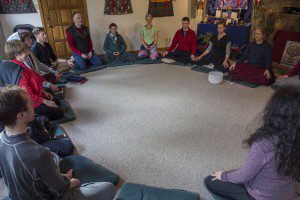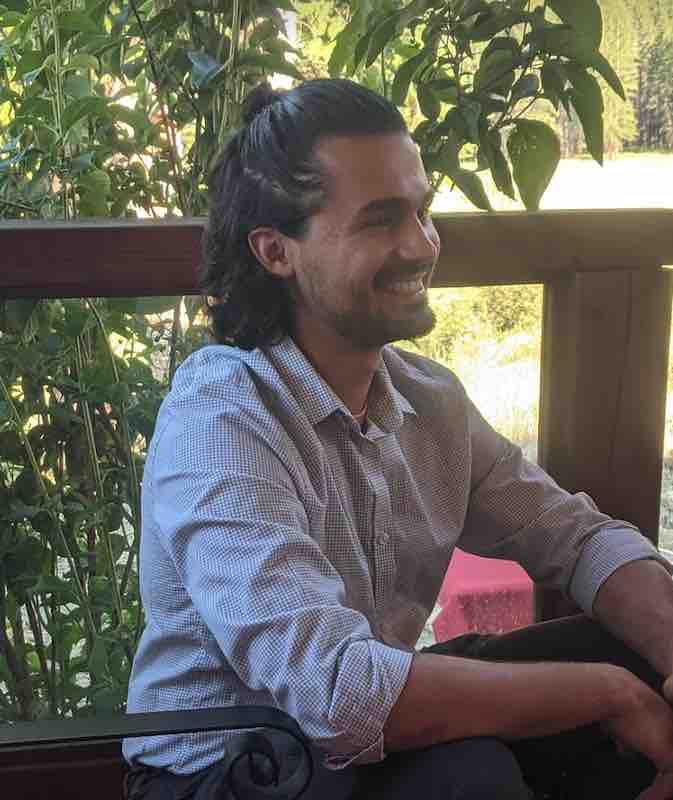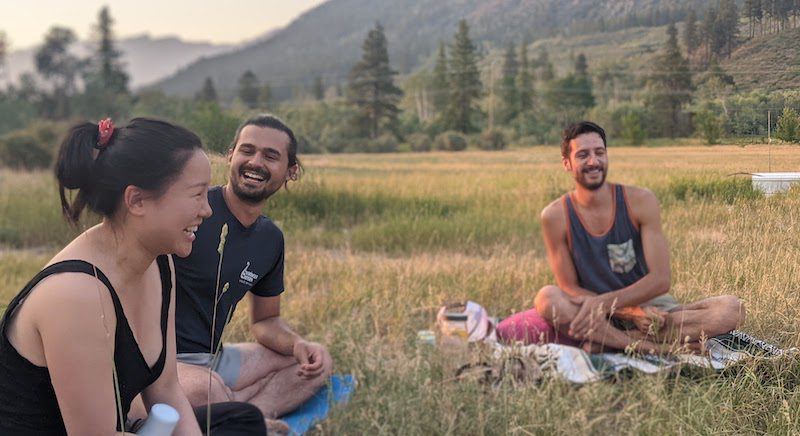All is Well: Finding Bliss in the challenge of Retreat
What comes to mind when you think of the word meditation? Does an image of a yogi in a cave high up on a mountain come up? Or maybe of the sage levitating above a cushion? Perhaps mindfulness-based stress reduction, meditation apps, or envisioning yourself on a tropical beach come to mind.
How about back pain, frustration, and constantly getting pulled into all sorts of stories and turbulent emotions?
It’s easy to idealize and romanticize meditation as a break from all your usual bullshit as you’re transported away to some more exalted and refined realm of the mind while on the cushion, and this was the attitude I had coming to Clear Sky Meditation Center on the 3-month Karma Yoga program. During the program I learned basic meditation practices and meditated with the group every day, but wasn’t really getting into the bliss states that I imagined were supposed to be happening. So I felt called to go deeper–I felt called to go on retreat.
The First Meditation Retreat

If you’re not familiar, a retreat is where you withdraw from your usual life (one could even say retreat from it… hmm!) for a period of time to go inward and focus exclusively on meditation, without the distractions of work, relationships, or even talking to other people. It’s a time of contemplation, of entering into deep stillness, ease, and peace… or so I thought.
I went on my first retreat at the end of the 3-month Karma Yoga program. At the suggestion of the teachers, Qapel and Sensei, I took part in a group retreat that was happening around that time. The topic of the retreat was Dzogchen–the advanced “practice of no practice” in which one simply recognizes the inherent luminosity, emptiness, and self-liberating nature of all phenomena that arise within the field of awareness.
Sounds easy, right?

As the retreat began I felt like a fish out of water. Everyone else participating had done multiple retreats before and seemed so at ease and comfortable in this space, and here I was jumping into the deep end with no idea what to expect. The members of the sangha could see I was nervous, and they compassionately gave me advice which could be summarized as “don’t worry; literally all you have to do is just be.” Of course, I didn’t take this advice, and found myself struggling and pushing and trying to get “over there”–anywhere but here!
So what's the story?
During this first week I managed to develop enough concentration that I could semi-reliably drop into a more spacious and empty space during meditation sits, but there was still a tension in this–the struggle to ignore the constant chattering of my mind. How most sits would go was I would try to focus on the inner emptiness, get carried away by a mental story (about some conversation I’d had the week prior, about what I would do after retreat, about what would be for lunch, about paying taxes, etc., etc.), realize that I was lost in a story, come back to the emptiness, get carried away by a story, and so on–over and over, for hours every single day.
Frustration started to set in. Why couldn’t I just focus? Why couldn’t I drop the story? This didn’t seem to be the easefulness and peace that I felt I’d been promised (promised by whom, I couldn’t tell you). If anything, my neurotic patterns seemed to be going into overdrive.
I had an interview with Clear Sky’s founding teachers, Qapel and Sensei, at the end of the first week, and my mind was spinning. I told them that what kept coming up for me again and again was the thought: I can’t do this. To this, Sensei frowned and said, “well that’s not a very nice thought, is it?,” and Qapel simply asked “who can’t do what?”
The teachers’ comments cut through the confusion. The belief that I couldn’t do it, couldn’t meditate properly, was simply another arising within the field of empty awareness. I didn’t have to do anything with it; I just had to see it clearly for what it was. The struggle wasn’t getting me anywhere, but was rather just a distraction from the simple truth that whatever is happening, regardless of what it is, is just fine.

Easing into things
For the rest of the retreat, whenever struggle or difficult emotions would arise, I would come back to the sense that it’s okay. There was no need to fix it, there was no need to change it, there was no need to try to get anywhere other than exactly where I was.
- Anger rushing up through the throat? Fine.
- Fear clenching in the gut? Cool.
- Mind scattered and seemingly pulling in all directions? Right on.
At the end of the retreat, Qapel asked me to summarize my time in retreat in three words. What arose immediately was the phrase, “nothing is wrong.” After a congratulatory fist bump he asked me to try again, this time framing it positively. Okay then, “all is well.”
As I’ve come out of retreat, the mantra all is well has stuck with me and helped me both on and off the meditation cushion, and maybe it can do so for you too. During meditation, when your back hurts, your mind is churning, and you would really rather get up off the cushion and eat a snack (or do literally anything other than meditate)–that’s okay. Just let these feelings be as they are. Similarly in daily life, when things are tough, when conflict arises, when you just want to be somewhere else doing something else–that’s alright too.
Let it be
Put another way, I learned that it’s okay for me to drop the struggle against the way things are in the present moment. Opening up and surrendering to whatever is happening right now has given me the freedom to act and move from a more integrated, more spacious place. And even when I fall back into old habits of struggling and fighting against life, I can catch myself and see that that’s okay, too. And each time I can catch this, it seems to get just a little bit easier than before. I couldn’t have learned this without the unwavering and compassionate support of the residents, who have had seemingly endless patience for all of my neuroticism, and the deep wisdom and guidance of the teachers. For both teachers and sangha, I’m deeply grateful.
So the next time you find yourself struggling to quiet the mind or avoid getting pulled into your patterns in meditation, see what happens when you let go of the feeling that you need to change something, that you need to control your experience. You might just find that this opens something up within you–a little more spaciousness, a little more lightness.



